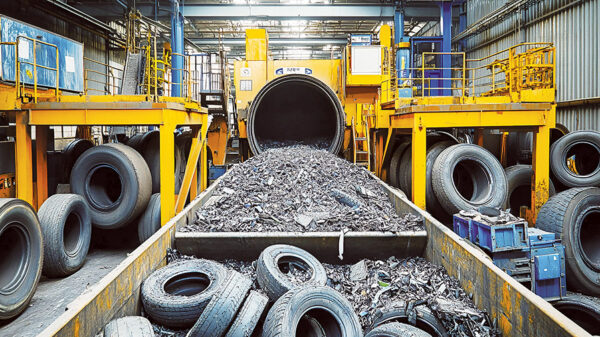A recycling facility in Kilgore, Texas, received a critical upgrade that will now sort out aluminum cans from single stream recyclables with an effective eddy current rather than by hand. This was made possible through a grant funded by can manufacturers Ardagh Metal Packaging and Crown Holdings.
Once installed in the material recovery facility (MRF), where recyclables are separated to make them ready for market, this equipment will result in 4 million more aluminum beverage cans captured annually.
The move from manual hand sorting to the new eddy current will increase annual used beverage can (UBC) capture at the facility by 50 percent. This is significant considering UBCs are one of the most valuable commodities in the recycling system.
The environmental and economic impact of these UBCs being captured and recycled is significant. When 4 million additional cans are captured and recycled each year at this one facility, it will generate more than $65,000 in new annual revenue and produce enough energy savings each year to power 1.5 million U.S. homes for one hour. Further, the carbon dioxide equivalent emissions avoided each year will be the same as is generated from charging more than 47 million smartphones.
The facility, a single stream MRF operated by Rivers Recycling, processes around 18,000 tons of material per year from the East Texas area. It is the sole MRF on the I-20 corridor between Dallas, Texas, and Birmingham, Alabama. The Texas recycling facility is the fifth MRF to receive funding from a grant program facilitated by Can Manufacturers Institute (CMI). CMI partnered with The Recycling Partnership to evaluate and select the grantees, execute the grant program and provide technical assistance to ensure successful implementation.
The grant program builds off the CMI research released last year that found it is critical to capture all UBCs flowing through MRFs, which play the vital role of sorting single stream recyclables. This research concluded that most MRFs in the United States would not be able to operate without the revenue from UBCs considering their relatively high economic value. Capturing more beverage cans means a healthier recycling system.
The first four grantees in the program were the City of Milwaukee and Waukesha County, Wisconsin; Curbside Management, Asheville, North Carolina; GEL Recycling, Port Orange, Florida; and Independent Texas Recyclers, Houston, Texas. Collectively, the equipment installed from the five grants will result in an additional 71 million aluminum cans recycled every year. The impact of 71 million aluminum beverage cans recycled is more than $1.15 million in revenue for the U.S. recycling system and energy savings that could power more than 28 million U.S. homes for one hour.
“Aluminum cans enjoy widely recyclable status and industry leading recycled content rates,” said Keefe Harrison, chief executive officer, The Recycling Partnership. “Yet, there is still a lot of valuable material lost in homes and at MRFs. We are happy to partner with CMI, Crown and Ardagh on this grant program delivering swift and impactful solutions that further increase successful can capture. The Recycling Partnership applauds their investment, and we look forward to continuing to partner with the aluminum can industry to improve the system and support their circularity goals.”
This grant program is the latest aluminum beverage can industry funded effort to build on its industry leading recycling rates and recycled content. These millions of cans captured each year for recycling will help CMI achieve the aluminum beverage can recycling rate targets its members set starting with a 70 percent rate by 2030. CMI identified four pillars of action to achieve its targets including one focused on proper sortation of beverage cans at recycling facilities. In 2022, CMI plans to provide a mix of grants and a lease-to-own program where CMI pays for the equipment and is paid back via some portion of the revenue from the cans that the equipment captures.







